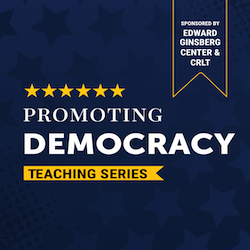
In a recent Educause Review article, John Seely Brown and Richard Adler write that becoming a master in a field involves a process of both “learning about” a subject and “learning to be” a practitioner of that field. Typically, in the early years of a curriculum, students spend a lot of time mastering content, but the important work of “learning to be”–or practicing the methods of the discipline–is left until the end. When we save experiential elements such as internships or research until the final stages of a curriculum, we miss an important opportunity to engage students early with some of the most complex and compelling aspects of our discipline.
How might we flip curricula in order to create more front-loaded experiences that engage students in “learning to be” earlier in their course of study? The U-M Law School offers one example. In a traditional law school curriculum, first-year students’ schedules are largely filled with doctrinal courses, which inform students about case law precedents in fields like contracts and criminal law. Only in the second year at the earliest do students usually engage in simulations, applied exercises, and clinics, where they represent real clients and practice lawyering skills in an applied setting.
Last year the U-M Law School engaged in an experiment to reverse this sequence of learning experiences. They now engage second-term, first-year students (1Ls) in activities that allow them to start practicing and thinking like a lawyer earlier. The Unemployment Insurance Clinic (UIC), directed by Steve Gray, provides an opportunity for 1Ls to work with real clients on administrative law cases. Second- and third-year students (2Ls and 3Ls) serve as mentors, to supplement Gray’s supervision of their work. Students work with clients, puzzle together through litigation strategy, and take the lead in administrative hearings.
In an assessment of the UIC conducted by CRLT, nearly three-quarters of student participants agreed, and all supervisors strongly agreed, that they would recommend participation in the UIC to future students. 1Ls and student supervisors overwhelmingly affirmed that the experience helped them develop skills important to being a lawyer, as well as their understanding of what it means to be a legal professional. One 1L reported, “To have gained the practical experience of developing legal arguments and conducting those arguments at multiple stages of the administrative law process as a second-semester law student has been beyond any practical experience I could have imagined gaining this early in my law school career.” Compared to a similar group of law students who didn’t participate, UIC students reported significantly higher ratings of their law school experience for development of legal ethics, legal strategy development, client relations, interpersonal skills, professionalism, and confidence in on-campus interviews.
These successes can be attributed to several practices and principles that could apply in a wide range of disciplines. Students are provided focused preparation, guidance during practice by both faculty and more senior student mentors, and feedback from clients. Moreover, as scholarship on authentic assessment suggests, practice in a real-world, high-stakes setting provides these students motivation to apply and improve their skills.
Teaching and learning scholar Randy Bass writes, “In a typical formal curriculum, students are first packed with knowledge, and if they stick with something long enough (i.e., major in a discipline), they eventually get to the point of engaging in practice.” How might students in your discipline gain opportunities to engage in practice early on? Such experiences can contribute to more students “sticking with” the discipline, as well as all students developing their skills more fully. When it comes to engaged learning, sooner may indeed be better.
- Log in to post comments
- 38 views






